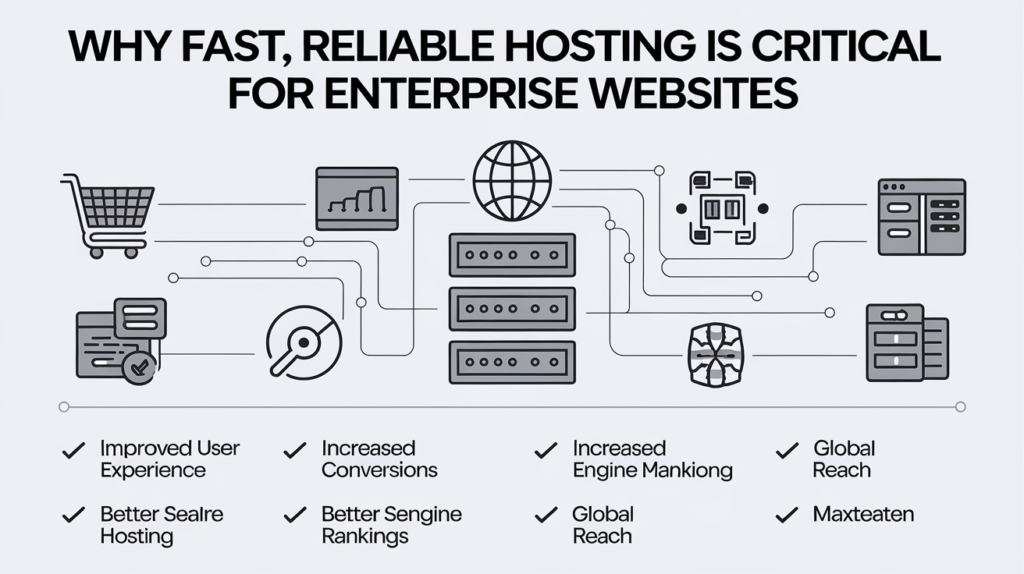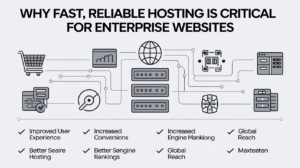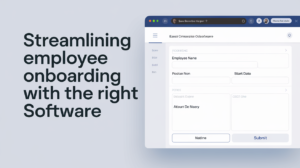In today’s digital age, your enterprise website is often the first point of contact between your business and potential customers. This digital presence must be seamless, fast, and reliable to ensure optimal user experience and business operations. In this blog post, we’ll delve deep into why fast, reliable hosting is indispensable for enterprise websites, exploring its benefits and the potential consequences of neglecting it.
Understanding the Importance of Web Hosting for Enterprises 🖥️
Web hosting is the backbone of your digital infrastructure. For enterprises, this means more than just having a live website; it means having a robust, high-performance platform that can support heavy traffic, safeguard sensitive data, and deliver content at lightning speed.
🚨 Why Speed and Reliability Matter
User Experience and Retention
- First Impressions Count: Research shows that users form an opinion about your website within the first few seconds. A slow-loading website can lead to significant bounce rates and lost opportunities.
- Customer Loyalty: Consistently fast and reliable hosting keep users engaged, improving the chances of return visits and fostering customer loyalty.
SEO and Google Rankings
- Page Speed as a Ranking Factor: Search engines like Google consider page speed in their ranking algorithms. A faster-loading website can achieve better SEO scores and higher search engine rankings.
- Mobile Friendliness: With the surge in mobile device usage, Google’s mobile-first indexing demands that enterprise websites perform optimally across all devices.
Revenue and Conversion Rates
- Decreased Cart Abandonments: For e-commerce enterprises, fast web hosting can directly impact sales. Slow websites frustrate potential customers, often leading to cart abandonment.
- Improved Conversions: Websites that load quickly provide a seamless user journey, improving conversion rates and ultimately, revenue.
Scalability and Reliability
- Handling Traffic Spikes: Enterprises often experience sudden spikes in traffic due to marketing campaigns or viral content. Fast, reliable hosting ensures your website can handle these surges without downtimes.
- Consistent Uptime: Reliable hosting providers offer uptimes of 99.99%, critical for maintaining your business’s online availability and reputation.
🔑 Key Features to Look for in Enterprise Web Hosting
Now that we understand the significance of fast, reliable hosting, let’s explore essential features for selecting the best hosting solution for your enterprise website.
High Bandwidth and Storage 🚦
- Supporting Heavy Traffic: Ensure your hosting plan offers ample bandwidth to handle traffic without performance dips.
- Large Media Files: Enterprise websites typically host high-resolution images, videos, and downloadable resources requiring substantial storage space.
Content Delivery Network (CDN) 🌍
- Global Reach: A CDN strategically places your content on servers worldwide, reducing latency and accelerating load times for users, irrespective of their location.
Robust Security Measures 🔒
- Data Protection: With increasing threats of cyber-attacks, choose hosting services that offer SSL certificates, DDoS protection, and regular malware scanning.
- Compliance: Ensure that the hosting provider complies with major security standards like GDPR, HIPAA, etc., to protect sensitive enterprise data.
Scalability Options 📈
- Future Growth: Ensure your hosting plan can grow with your business, accommodate increased traffic, and offer scalability without frequent migrations.
- Flexible Resources: Look for services that allow easy adjustments in CPU, RAM, and storage based on your enterprise’s evolving needs.
24/7 Customer Support ⏲️
- Rapid Response: Reliable customer support can quickly resolve issues, ensuring your website maintains optimal performance.
- Expertise: The support team should be adept in handling complex enterprise-level queries.
📈 Best Practices for Optimizing Website Performance
Even with the best hosting, enterprises should adopt practices to optimize performance further. Here are some actionable insights:
Regular Monitoring and Testing
- Performance Monitoring Tools: Use tools like Google PageSpeed Insights or GTmetrix to monitor performance and identify areas needing improvement.
- Load Testing: Conduct regular load testing to ensure your website can handle anticipated traffic levels.
Optimize Images and Media
- Compression: Compress images without losing quality to speed up load times.
- Lazy Loading: Implement lazy loading to delay the loading of off-screen images, enhancing initial page load time.
Leverage Caching
- Browser Caching: Enable browser caching to store resource files on local devices, reducing server load and speeding up subsequent visits.
- Server-side Caching: Utilize server-side caching to store copies of your website’s pages, reducing server processing time for requests.
Minimize HTTP Requests
- Combine Files: Reduce HTTP requests by combining CSS, JavaScript, and HTML files.
- Clean Code: Keep your website’s code clean and efficient, eliminating unnecessary lines and comments.
Utilize Modern Web Technologies
- HTTP/2: Adopt HTTP/2 for faster data transfer rates and improved web performance.
- AMP (Accelerated Mobile Pages): Use AMP to create fast-loading mobile web pages, especially beneficial for content-heavy sites.
Conclusion: Investing in Fast, Reliable Hosting for Long-Term Success 🎯
For enterprises, investing in fast, reliable hosting is not just a technical consideration but a critical business decision with far-reaching implications. Superior hosting enhances your website’s performance, impacts user satisfaction, SEO rankings, and ultimately, profitability. By choosing the right hosting solution and adopting best practices, you can ensure your enterprise website remains a powerful, effective tool in achieving your business goals.











